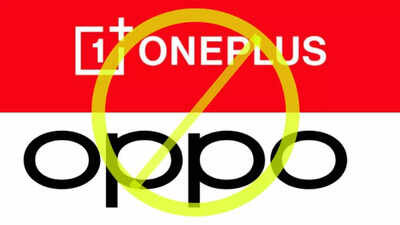Oppo and OnePlus phones banned in Germany: Why, what next and more – Times of India

Oppo has suffered a severe legal setback in Germany. According to a report in Nokiamob.net, the Mannheim Regional Court has ruled in favour of Nokia against its recent patent dispute with Oppo. The court gave this ruling in two lawsuits filed by Nokia against Oppo and OnePlus. The Finland-based Nokia had sued Oppo in four different countries in 2021 after failing to reach an agreement with the Chinese smartphone giant. This for now prohibits the two brands from selling their devices in Germany.
Are Oppo and OnePlus phones banned permanently in Germany
No. Nokia has landed its first victory in the patent dispute against Oppo. It is, however, the first verdict in the battles. For now, Oppo and its sister brand OnePlus may no longer be able to sell mobile devices in Germany that infringe Nokia’s European patent EP 17 04 731.
What is the lawsuit about
The patent reportedly protects a technology for scanning WiFi connections. In July 2021, Nokia filed several patent infringement lawsuits against Oppo in several countries in Asia and Europe, including India, UK, France and Germany. The lawsuit accuses Oppo of using patented Nokia technology without having valid licenses in its devices. According to a report in CNBC, the lawsuit claims that Oppo is using Nokia’s standard-essential patents (SEPs) and non-SEPs like UI/UX and security features without license. The lawsuit was filed after the previous patent licensing deal between the two companies was not renewed. Oppo and Nokia had entered into an agreement in November 2018 that expired in June 2021.
What did Nokia say
Nokia says that Oppo rejected its “fair and reasonable” proposal. “We have been negotiating the renewal of our patent licensing agreement with OPPO, but unfortunately, they have rejected our fair and reasonable offers. Litigation is always our last resort, and we have offered to enter into independent and neutral arbitration to amicably resolve the matter. We still believe this would be the most constructive way forward,” Nokia said in a statement as per Nokiamob.
Oppo termed the lawsuit “shocking”, and has filed counter lawsuits against Nokia
Responding to the lawsuit Oppo said, “OPPO respects and protects its own and third-party intellectual property rights, and has been committed to benign patent licensing cooperation in the industry. OPPO opposes unreasonable consultations such as using litigation as a tool.” Just months after Nokia’s lawsuit (in September 2021 to be precise), Oppo filed several patents infringement lawsuits against the company in China and Europe. These patents involve all 5G standard essential patents.
Nokia has taken several companies to court including Apple and Lenovo
Oppo is not the first company Nokia has sued. In May 2017, Apple paid Nokia $2 billion to settle a patent lawsuit. Nokia had accused Apple of infringing some of Nokia’s patents as well as patents from NSN and Alcatel-Lucent, the companies that Nokia owns. The two companies, however, quickly settled their dispute and now collaborate on several technologies. Nokia had also filed a patent infringement lawsuit against Lenovo in the US, Brazil, India and Germany. This lasted almost a year and was finally settled by the two companies in April 2022.
FacebookTwitterInstagramKOO APPYOUTUBE
For all the latest Technology News Click Here
For the latest news and updates, follow us on Google News.

